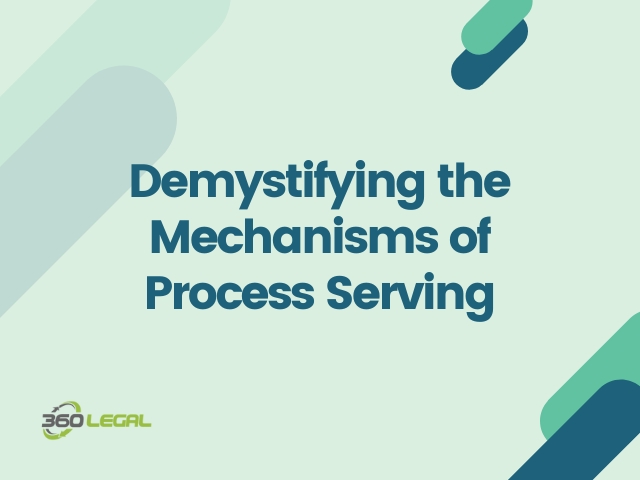Testing RSS Feeds.. ignore post.
Testing RSS Feeds.. ignore post.
Demystifying the Mechanisms of Process Serving

Legal procedures are a labyrinth of statutes, regulations, and obligations. Among the myriad components of this complex machinery is process serving – an often misunderstood yet crucial element of the legal ecosystem. This article aims to demystify the intricacies of process service and its integral role in upholding the principles of justice.
What is Process Serving?
Process serving, at its core, is a procedure whereby involved parties in a lawsuit receive notice of legal actions against them or court orders that affect their interests. This notice, generally in the form of documents such as subpoenas, complaints, writs, or summonses, must be ‘served’ to the parties, establishing their awareness of the proceeding.
The Significance of Process Serving
The roots of process serving stem from the 5th and 14th Amendments to the US Constitution, which ensure every person’s right to due process. This principle upholds the rights of an individual to be informed if they are summoned or involved in any legal action. It underlines the equitable ethos of justice: every party can present their story. Process serving, therefore, serves as a critical lynchpin that maintains the balance of fairness and transparency within the legal framework.
Mechanics of Process Serving
1. Who are Process Servers?
Process servers are typically individuals (often, but not always, associated with a process-serving company or law enforcement officers tasked with delivering the notice to the relevant party. In some cases, anyone over 18 who is separate from the case can serve the process. It is important to note that these regulations may vary depending on local and state laws.
Typically, a process server tries to deliver the documents to the defendant. However, if multiple attempts are unsuccessful, they might resort to ‘substitute service,’ i.e., leaving the documents with a responsible adult at the defendant’s residence or workplace, or ‘service by publication,’ where the notice is published in a local newspaper.
Leveraging 360 Legal’s proprietary defendant location technology THEIA™, 360 Legal enhances process serving by meticulously analyzing each service request, comparing the defendant’s address against a vast database of over a million previous service records and public information, thereby effectively penetrating outdated or erroneous location details and optimizing the accuracy of locating individuals for paper delivery.
3. Affidavit of Service
Once the documents are delivered, process servers must provide an ‘Affidavit of Service’ – a notarized document confirming the date, time, and person to whom the papers were served. This legal document serves as proof of service and helps maintain the integrity of the legal proceedings.
Challenges in Process Serving
Despite its apparent straightforwardness, process serving can be fraught with obstacles. Defendants can be evasive or hard to locate, causing service delays. Process servers may sometimes face hostility or even danger when serving papers. Moreover, any deviation from the stipulated protocol can result in a ‘quash’ or invalidation of service, causing further legal complications.
Despite its seemingly straightforward nature, process serving is often fraught with several challenges. A common difficulty is the elusive nature of some defendants who deliberately evade being served, frequently changing addresses or using false names. In addition, process servers can encounter hostility or even physical danger when delivering documents, especially in contentious cases.
Another challenge arises from strictly adhering to the varying rules and laws governing the service of process in different jurisdictions. Even a tiny mistake can render the service void, leading to the dismissal of a case or necessitating a redo of the entire process. The COVID-19 pandemic also presented a unique challenge, with social distancing measures and public health concerns complicating the personal service process. Last but not least, while technology has made the process easier, it has also created new challenges, such as problems with electronic privacy or making sure the intended party received and opened a served digital document.
The Role of Technology in Process Serving
Technology has seeped into process serving in recent years, introducing efficiency and transparency. GPS tracking, databases, and online resources have significantly aided in locating defendants. Video technology provides undisputed evidence of service, eliminating ‘he said, she said’ scenarios. Some states have even allowed service via electronic means such as email or social media, reflecting the evolving landscape of process serving.
The Evolution and Future of Process Serving
In law, traditions run deep, and change is often slow to take root. However, societal and technological advancements have significantly evolved the process-serving industry. Initially, process serving was primarily the domain of law enforcement. Over time, the role expanded to include professional process servers and even ordinary citizens who meet specific criteria.
The digital revolution has left an indelible mark on process serving. In some jurisdictions, electronic service of process via email or social media has been recognized as a valid method of delivering court documents. This service can expedite the process, especially when the parties involved need help locating or evading service. Despite potential challenges such as confirming receipt and identity verification, the potential of electronic service is considerable.
Artificial intelligence (AI) and machine learning (ML) present further exciting opportunities for process serving. From predictive analytics that can anticipate evasive behavior to automation that can streamline administrative tasks, these technologies can dramatically enhance efficiency and accuracy in process serving.
Moreover, the global COVID-19 pandemic has hastened the need for change, pushing courts and legal practitioners to adopt remote and contactless means of carrying out legal procedures, including process serving.
Looking ahead, process serving is set to evolve further. Blockchain technology, for instance, may provide solutions for secure, verifiable electronic services. On the horizon, we may even see drones being used for process serving, underscoring that the future of this crucial legal procedure is anything but static. As we move forward, a balance will be needed between leveraging these advancements and maintaining the integrity, fairness, and effectiveness of process serving.
Conclusion
Understanding process serving demystifies a critical component of the legal machinery. As an indispensable bridge between the court and the individuals involved in a lawsuit, process serving underscores the ideals of transparency, fairness, and due process. As technology continues to shape its contours, process serving stands at the cusp of an exciting evolution that will likely redefine its scope and implementation.
Author
We are Social!
Latest tweets
Popular Tags
Testimonials
"5 star service ! prompt serving, helpful, professional . "
"Mike is awesome. Our firm has hired him on several occasions and we are very happy with his work. His prompt serving, helpful, professional and always in communication. I recommend him highly! "
"360Legal provides speedy and easy to use Process Service that is flexible, and very transparent with nearly instant reporting. It is very helpful for us to be able to track the status of our process service jobs, especially when they are time sensitive. "
Latest News
-

RMAI 2021 Annual Conference RMAI Annual Conference
April 12-15, 2021 -

NATIONAL CREDITORS BAR ASSOCIATION 2020 SPRING CONFERENCE
May 19-21, 2021 -

ALFN ANSWERS 2021
Jul 18-21, 2021 -

Annual Convention and Expo
Oct. 17-21, 2021 -

Florida Association of Professional Process Servers 33rd Quarter Board Meeting/Professional Beach Getaway
Aug. 20-22, 2021












